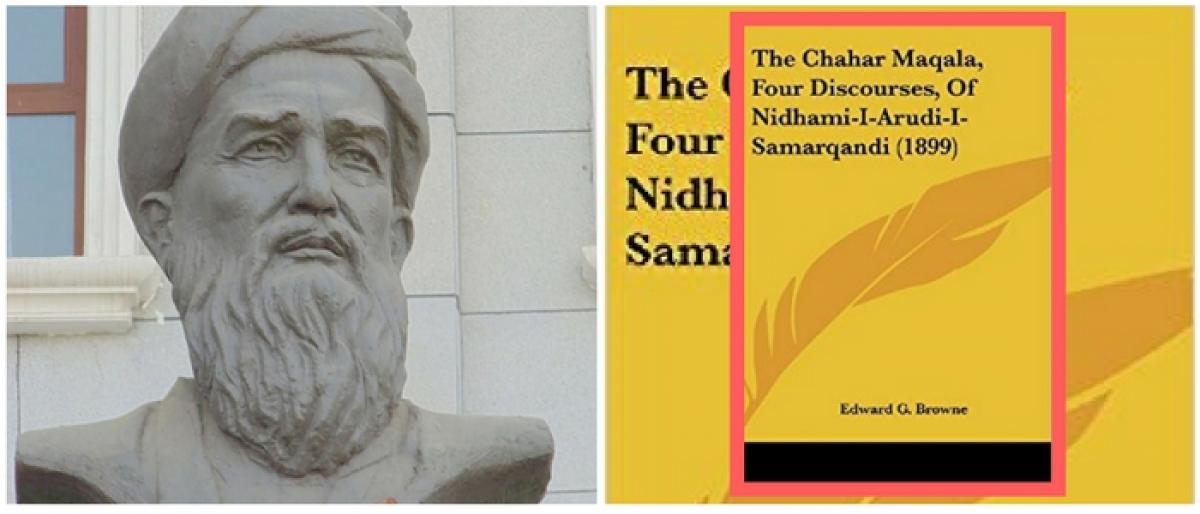Power of Poetry

It is not a fable, though it may seem like one. A prince is so entranced by an unparalleled city of his dominions that he lingers in it year after year, while his courtiers grow increasingly homesick and long to be reunited with their families. But nobody has the courage to broach the matter.
A poem by Rudhaki , considered the founder of classical Persian literature and the "Adam of Poets", sent a prince galloping for home
It is not a fable, though it may seem like one. A prince is so entranced by an unparalleled city of his dominions that he lingers in it year after year, while his courtiers grow increasingly homesick and long to be reunited with their families. But nobody has the courage to broach the matter.
Finally, somebody gets the idea to seek the help of a master poet and the results are unbelievably instantaneous.
To reiterate, this is not a fable for this incident involves real people, time and places and comes to us not from storytellers but NizamiSamarkandi's‘ChahárMaqála (The Four Discourses)’, a 12th century Persian prose work of literary and secular instruction.
But, in its theme and its description, and above all its provenance – Iran and Central Asia in the 10th century AD, it is the stuff of which fables are made and thus can figure in the line of forgotten epics of the Indian subcontinent and its close neighbours. Above all, it shows the effect of poetry – how the right verse said at the right time can strike the right chord and convert a dormant feeling into resolute action.
The tale is of Samaanid Prince Nasr II ibn Ahmed (914-943), his desperate courtiers and poet Abu Abdullah Jafar ibn Mohammad ibn Hakim ibn Abdurrahman ibn Adam RudakiSamarkandi (or Rudhaki or Rudagi; c858-941), considered the founder of classical Persian literature and the "Adam of Poets".
As the story goes, this scion of the Samanid Empire, the first native Persian dynasty in Greater Iran and Central Asia after the Arab conquest and the Sassanid empire's collapse had been camping in Herat, while his courtiers were homesick for their Bukhara. Subtle hints were met by the Prince's answer that the return would take place "after winter". The problem was that at least three years had passed with this promise.
To be fair to the Prince, it was a captivating place – with 120 different varieties of the grape, "each sweeter and more delicious than the other; and amongst them are in particular two kinds which are not to be found in any other region of the inhabited world, one called Parniyan and the other Kalanjari, thin-skinned, small-stoned and luscious, so that you can say they contained no earthly elements.
The desperate officers and courtiers went to Rudaki, "than whom there was none more honoured of the kings' intimates, and none whose words found so ready an acceptance" and said to him, "We will present thee with five thousand dinars if thou wilt contrive some artifice whereby the king may be induced to depart hence, for hearts are craving for our wives and children, and our souls are likely to leave us for longing after Bukhara." Rudaki agreed; and "since he had felt the Amir's pulse and understood his temperament, he perceived that prose would not affect him, and so had to recourse to verse".
He therefore composed a qasida one evening at the court, "when the musicians ceased, he took up the harp, and began: 'BooyejuyeMulianayaadhami/Yaad-e-yaar-e-mehrbaanayaadhami.." (for non-Farsi-speakers, the Ju-yiMulian we call to mind,/We long for those dear friends long left behind...) referring to a water course in Bukhara. And he had not sung two stanzas when it worked its magic.
"No poem, perhaps, ever produced such sudden effect, as the Amir leaped on to the saddled horse, which was always kept ready for an emergency, without even donning his boots, and left his astonished courtiers to follow as best they might," says British scholar PMSykes, in his 1910 travelogue ‘The Glory of the Shia World’.
The ‘ChaharMaqalla’ adds that Nasr "set off for Bukhara so precipitately that they carried his leggings and riding-boots after him for two parasangs, as far as Buruna, and only then did he put them on; nor did he draw rein anywhere till he reached Bukhara, and Rudaki received from the army the double of that five thousand dinars".
But, Rudaki did not end up with a happy life or legacy. His last years were spent in poverty and blindness, and of his, over million verses, only 52 qasidas, ghazals and rubais survive, as well as a few fragments of his epic masterpieces while his translation of the Panchtantra is lost. In light of his capability as this anecdote shows, it is a colossal tragedy.










